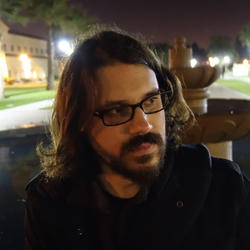Alex Chechile

Alex Chechile is a sound artist, composer and electronic artist whose work develops in parallel with research in neuroscience, psychoacoustics and the biomechanics of hearing. With a particular interest in the relationship between sound and the body, his immersive compositions, installations and performances aim to bring transparency to otherwise invisible processes in biological and technological systems. Questions that arise in his artistic work lead to formalized studies, and the results cyclically inform his sonic practice.
Chechile is a leading researcher on the psychoacoustic study and creative application of difference tones, which are sounds that are generated in the inner ear and are perceived as localized within the head. His work exhibits how difference tones expand layers of sonic material to include sounds outside the acoustic space, as well as how they create an additional nested layer of spatial depth between loudspeakers and ears.
Moving beyond the established two-tone difference tone paradigm, Chechile’s behavioral research shows up to seven additional types of difference tones are reliably perceived from multi-tone acoustic stimuli. In his series of pieces On the Sensations of Tone (2010— ), Chechile explores the physicality of sound and spatial depth using difference tones, and his Ear Tone Toolbox is the first widely available collection of software and modular instruments for evoking the phenomenon.
As a performer, Chechile was a founding member of Pauline Oliveros’ band Tintinnabulate, collaborated with Mercury Rev, and performed a solo opening act for Primus. His projects have been supported by the Mellon Foundation, the New York State Council on the Arts (NYSCA), Harvestworks, Issue Project Room, the Experimental Television Center, the Deep Listening Institute and the American Embassy, among others. His work has been presented worldwide at festivals and venues including the IRCAM, MoMA, ICMC, Electronic Music Midwest, EMPAC, the New York Electronic Arts Festival and Cité Internationale des Arts.
Chechile is currently a research fellow at the Studio for Research in Sound and Technology (SRST), where he also teaches. Prior to RISD, Chechile worked with the Stanford Graduate School of Education and K-12 schools worldwide on a postdoc on remote and accessible creative practices during the pandemic. This work was recognized by Stanford for supporting justice, equity, diversity and inclusion. He holds a PhD from Stanford University’s Center for Computer Research in Music and Acoustics (CCRMA), an MFA in Electronic Art from Rensselaer Polytechnic Institute and a BA in Music from Tufts University.